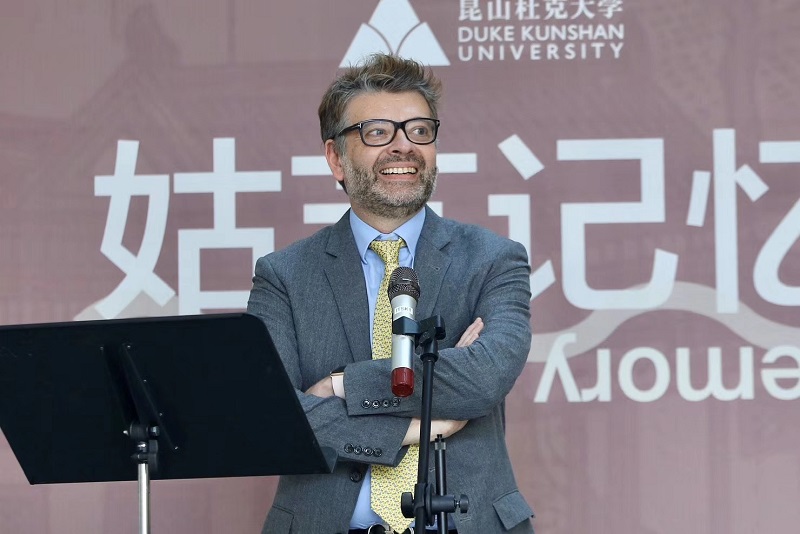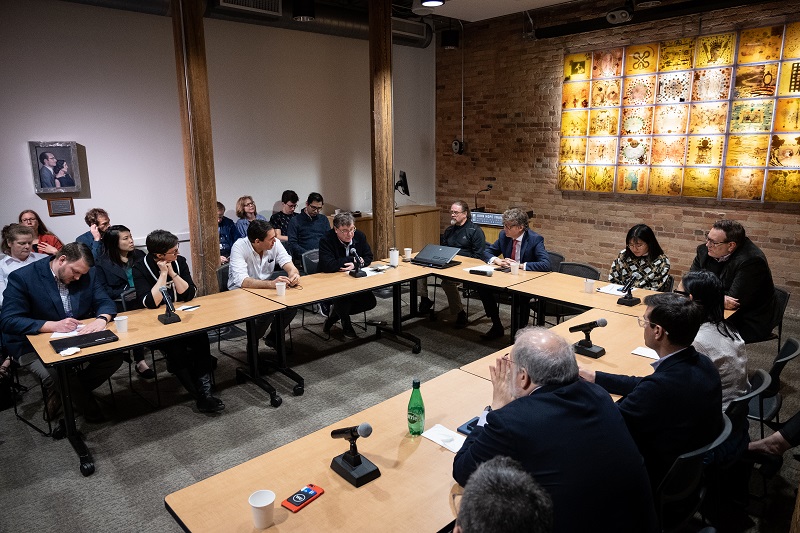
Humanities professor James Miller has become Duke Kunshan’s first dean of interdisciplinary strategy
James Miller’s academic journey has seen him cross many disciplinary borders. As a young scholar of Chinese studies, he explored language, history, art and literature; and as a graduate student at Cambridge University, he drew from the worlds of philosophy, anthropology and sociology to understand how religion functions in society.
Yet it was an event at Harvard University two decades ago that showed him how integrating disciplinary knowledge can lead to bold, world-changing ideas.
‘It was a series of conferences in which religious scholars sat down with climate scientists, ecologists and environmental activists to work out what the world’s religious traditions could contribute to transforming our society in a more sustainable fashion,’ said Miller, a noted expert in Daoism. ‘The results were both innovative and socially relevant. It was a key experience for me.’
The experience stoked in Miller a deep belief in interdisciplinarity, a disruptive mindset that looks to work across traditional educational concepts and approaches to create novel solutions to practical problems. It is a belief he has carried throughout his career, including at Duke Kunshan, where he joined as professor of humanities in 2018.
Over the past two years, as co-director of the Humanities Research Center (HRC), he has spearheaded the creation of research labs focused on interdisciplinary fields such as health humanities, and the ethics of artificial intelligence.
Now, as the university’s inaugural associate dean of interdisciplinary strategy, Miller will work to foster interdisciplinary innovation, which is ingrained in Duke Kunshan’s DNA, and prevent the siloed thinking often found in the structures and academics of traditional institutions of higher learning.
‘DKU has a unique undergraduate curriculum in that interdisciplinarity underpins every major,’ said Scott MacEachern, vice chancellor for academic affairs. ‘Our majors are designed to help students creatively engage the problems of the 21st century, not simply reproduce the thinking and approaches of the past two centuries.’
For example, the issue of sustainability is a paradigmatic case for cross-disciplinary collaboration, said Miller. ‘We’ve known about climate change for the past 40 years, but we’ve failed to do enough about it. What we have learned in this time, though, is how scientists and researchers need to work with politicians and other cultural influencers to change the mindset of society,’ he said.
Duke Kunshan’s common core curriculum, and in particular the second-year Global Challenges course, trains students to address such complex issues as climate change, while faculty are encouraged to incorporate emerging global issues in their class syllabus.

Miller joins experts in political science, global health, media and the arts for a livestreamed discussion at Duke on the broader implications of the Covid-19 emergency
Shortly after the onset of Covid-19, a team of professors covering public policy, global health and infectious diseases teamed up to offer an entirely new course on international pandemic response, effectively allowing students to learn about the global situation as it developed in real time.
‘The coronavirus is itself an interdisciplinary issue,’ Miller said. ‘Treating it is a medical issue; the official response is a political issue; the disease’s effect on society is a social issue; comparing it with earlier pandemics is a historical issue; and understanding whether it was precipitated by broad changes in human-animal relationships is an ecological issue.
‘An effective human response to Covid-19 requires scientists, politicians, historians, ethicists, anthropologists, and many others, to work together.’
Despite the challenges caused by Covid-19, which forced Duke Kunshan to close its campus and move teaching online within a matter weeks, Miller seized the opportunity to strengthen the HRC’s connection with Duke University’s Franklin Humanities Institute (FHI) and engage students through initiatives in digital humanities.
In addition to a series of Zoom talks on the future of interdisciplinarity, the HRC held an online panel discussion with the FHI on the human, social and political implications of the coronavirus with experts in political science, global health, media and the arts. It also launched the Covid-19 Memory Archive to document the individual and shared experiences of students, faculty and staff.
Miller, who has a Ph.D. in religious and theological studies from Boston University, previously served as director of the School of Religion at Queen’s University, Canada. He has published six books including ‘China’s Green Religion: Daoism and the Quest for a Sustainable Future,’ and he is editor-in-chief of the international journal Worldviews: Global Religions, Culture, and Ecology.
‘I came to DKU to teach humanities, the key question of which is what it means to be human,’ Miller said. ‘To answer this question, we certainly need to deepen our understanding of the world’s histories, languages and cultures, but in today’s world, we face an urgent demand to analyze the human implications of science and technology.
‘This involves deepening our knowledge within our disciplines and integrating our knowledge across disciplines. In this way, we can make sure that all our work at DKU can better serve the whole of society.’

